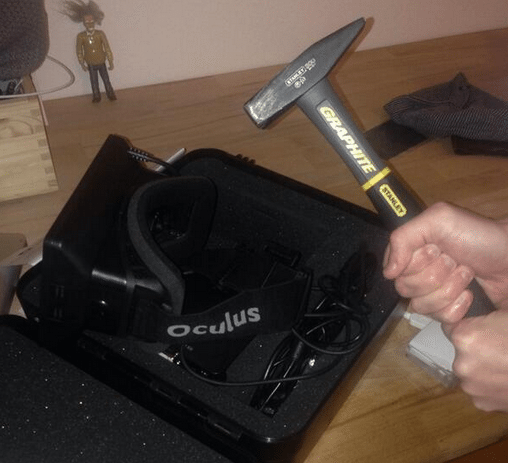So did you hear that Facebook bought Oculus VR for $2 billion?
It’s the story that the entire tech world was talking about, and for good reason. Oculus is a clear leader in the world of virtual reality hardware. It’s one of the poster children for the ever-growing crowdfunding industry, a grassroots story that had gone from a young man’s garage to a tech success story seemingly overnight. What’s not to like?
Well, Oculus’s Kickstarter supporters have answered that question for everyone. That comes as no surprise. There’s a few things we can learn in the aftermath of this acquisition.
Oculus’s backers could have been so rich you guys
 This is one of my favorites. I saw this narrative on Mashable, Pando and others. I’ll pick on Pando…
This is one of my favorites. I saw this narrative on Mashable, Pando and others. I’ll pick on Pando…
This deal highlights the problem with funding technologies that might eventually be acquired by large companies like Facebook. Traditional investors are overjoyed by the deal, which will reportedly offer a 20-times return on investment. But the people who backed the company’s Kickstarter project are dismayed by the deal, partly because their money went to a company that eventually sold for $2 billion and partly because they backed a technology they wanted to see thrive, not a company they wanted to see sold.
Now, this excerpt does bring up a good point that I’ll get to later, but let’s zoom out. Luckey & co. would have been insane to take dilutive capital early in the process of developing Oculus. It was a clear winner. That is why VCs were practically fighting each other to get in early! Reporters from all sectors of tech media drooled on themselves for months while that Kickstarter campaign was going on, myself included. It was about as “duh” as an early-stage consumer play gets. (10/10 Zuckerbergs agree)
Crowdfunding backers will fight for a product and become a product’s biggest advocates. They’ll also turn on leadership. Both of these outcomes are spurred by the same phenomenon. Backers invest emotionally. Take that for granted and risk alienating your early adopters. That isn’t Kickstarter’s fault; rather, it’s the company’s great promise.
Credit to Luckey for really doing his due diligence and having a solid prototype before bringing his product out into the world. That alone is a lesson for future crowdfunders or entrepreneurs in general. When people say ideas are a dime a dozen they’re serious. Working prototypes get the funding and build fortunes.
Let’s say Title III was implemented here in the states. Would it have then been some huge injustice that Oculus didn’t take equity crowdfunding cash from the crowd? No. It’d be an injustice if they did.
In short, this isn’t a problem with the funding technology. It’s a problem with Oculus, which brings us to…
Crowdfunding backers do invest in these companies, but not with money and not for equity
No, rewards-based crowdfunding backers are not investors in the securities sense. They’re essentially customers (See point #3 below). However, they are investors in a different sense.
After Oculus sold, it was crystal clear that backers of the company and/or the associated Kickstarter campaign felt a deep, personal connection to the brand that was Oculus. Zuckerberg made the announcement and instantly people came out of the woodwork complaining and chastising the deal. A vast majority that voiced anything at all felt wronged. Duped. Hoodwinked. They wanted refunds. They disavowed the company, promised to cut ties and support competitors. Exhibit A…

My first inclination was to dismiss this as the type of shallow, reactionary fluff that often accompanies enormous deals like these. Truth be told, a vast majority of us don’t even fully understand these deals. Seriously… what do we know about the inner workings and market ramifications of a $2 billion acquisition? I’ll be happy if the -illion with the M is a part of my life at some point.
Then I thought about it and I realized that we’ve seen this before. Think back to the Canonical campaign for the Ubuntu Edge on Indiegogo. Full disclosure, I was pretty hard on Canonical for not extending the campaign and really trying to get the campaign fully funded. I felt it was a clear indicator that they never intended to fund the campaign at all. It was, in my mind, a prolonged publicity stunt. I think a lot of Canonical backers felt the same way, and they let it be known after the campaign ended.
Crowdfunding backers will fight for a product and become a product’s biggest advocates. They’ll also turn on leadership. Both of these outcomes are spurred by the same phenomenon. Backers invest emotionally. Take that for granted and risk alienating your early adopters. That isn’t Kickstarter’s fault; rather, it’s the company’s great promise. Kickstarter is as much a passion engine as it is a funding engine. I suppose my advice is be careful where you direct that passion.
At the risk of stereotyping a vast swath of varying individuals, do gaming’s early adopters and indie developers strike you as the type of group that wants Mark Zuckerberg involved in anything? Oculus was tone-deaf, that’s all. It doesn’t even mean the move was wrong. In fact, I’d be shocked if a backroom conversation didn’t take place highlighting that the deal wasn’t going to go over well.
I saw one quote on Reddit… “This is like Walmart buying SpaceX.” The popular reaction was pretty predictable.
It’s time to put the donation thing to rest, because these aren’t donations
 A common theme seen throughout the discourse in the days following the acquisition: Kickstarter contributions are just donations, they aren’t investments or purchases.
A common theme seen throughout the discourse in the days following the acquisition: Kickstarter contributions are just donations, they aren’t investments or purchases.
Let’s put that one to rest. These are commercial transactions. That’s why you can file a chargeback. It’s why Kickstarter is not a store. It’s why PayPal froze funds for various crowdfunders last year. It’s why Kickstarter’s Terms of Service read like this…
- The Estimated Delivery Date listed on each reward is not a promise to fulfill by that date, but is merely an estimate of when the Project Creator hopes to fulfill by.
- Project Creators agree to make a good faith attempt to fulfill each reward by its Estimated Delivery Date.
- For all campaigns, Kickstarter gives to the Project Creator each Backer’s User ID and pledge amount. For successful campaigns, Kickstarter additionally gives to the Project Creator each Backer’s name and email.
- For some rewards, the Project Creator needs further information from Backers, such as a mailing address or t-shirt size, to enable the Project Creator to deliver the rewards. The Project Creator shall request the information directly from Backers at some point after the fundraising campaign is successful. To receive the reward, Backers agree to provide the requested information to the Project Creator within a reasonable amount of time.
- Kickstarter does not offer refunds. A Project Creator is not required to grant a Backer’s request for a refund unless the Project Creator is unable or unwilling to fulfill the reward.
So, basically, Kickstarter eschews some liability both on behalf of itself and the project creator. Fair enough. Next bulletpoint…
- Project Creators are required to fulfill all rewards of their successful fundraising campaigns or refund any Backer whose reward they do not or cannot fulfill.
Kickstarter is establishing the fact that project creators have to either deliver or refund. That doesn’t sound like a donation, does it?
As far as PayPal, WePay and any other payment processor is concerned – and, specifically, as far as the laws regulating those companies are concerned – backers are buying. It’s the biggest dissonance in rewards-based crowdfunding.

